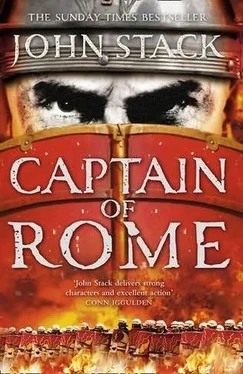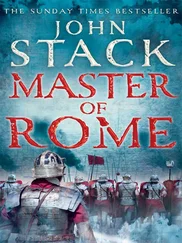John Stack - Captain of Rome
Здесь есть возможность читать онлайн «John Stack - Captain of Rome» — ознакомительный отрывок электронной книги совершенно бесплатно, а после прочтения отрывка купить полную версию. В некоторых случаях можно слушать аудио, скачать через торрент в формате fb2 и присутствует краткое содержание. Жанр: Исторические приключения, на английском языке. Описание произведения, (предисловие) а так же отзывы посетителей доступны на портале библиотеки ЛибКат.
- Название:Captain of Rome
- Автор:
- Жанр:
- Год:неизвестен
- ISBN:нет данных
- Рейтинг книги:3 / 5. Голосов: 1
-
Избранное:Добавить в избранное
- Отзывы:
-
Ваша оценка:
- 60
- 1
- 2
- 3
- 4
- 5
Captain of Rome: краткое содержание, описание и аннотация
Предлагаем к чтению аннотацию, описание, краткое содержание или предисловие (зависит от того, что написал сам автор книги «Captain of Rome»). Если вы не нашли необходимую информацию о книге — напишите в комментариях, мы постараемся отыскать её.
Captain of Rome — читать онлайн ознакомительный отрывок
Ниже представлен текст книги, разбитый по страницам. Система сохранения места последней прочитанной страницы, позволяет с удобством читать онлайн бесплатно книгу «Captain of Rome», без необходимости каждый раз заново искать на чём Вы остановились. Поставьте закладку, и сможете в любой момент перейти на страницу, на которой закончили чтение.
Интервал:
Закладка:
Longus stepped down from the podium and made his way to his seat as a rival took to the centre of the floor to make his own case for election. Duilius turned in his seat, away from the speaker but also from Longus, conscious that the young senator was probably staring across at him, hoping once again to catch his eye. The thought made Duilius uncharacteristically re-examine his decision to promote Longus as a candidate for the junior consulship. With his own victory assured, Duilius’s endorsement carried significant weight and he had chosen carefully, conscious that his decision would be examined minutely by every senator. Longus had many flaws as a man, his inexperience exacerbating many of them but Duilius was sure of one inimitable quality that Longus possessed, and that was loyalty. In the maelstrom of shifting alliances and duplicitous allegiances that defined the Senate, Duilius would always be sure of Longus’s support. Duilius’s uncertainties dissipated as he reaffirmed his decision and he let his mind drift to other topics, ignoring the rambling polemic from the speaker at the podium. His gaze extended to the colonnaded entrance to the chamber and lengthening shadows of the day, consciously willing the sun to speed its progress to a point below the horizon. As his eyes moved over the spaces between each column he spotted the familiar figure of Lutatius, his private secretary, and the sight arrested his attention and chased every thought from his mind. Lutatius was unmoved, his gaze locked on his master and although he did not gesture, his mere presence spoke of an urgency that Duilius could not ignore. The consul stood up and walked directly to the exit, his abrupt movement causing the speaker to pause in indignation at the unprincipled insult inherent in Duilius’s departure and a muttered undertone of disapproval swept through the house. Duilius was oblivious however, his attention locked on Lutatius. Sundown, the traditional close of business in the Senate, was less than an hour away, Duilius thought. What was so urgent that Lutatius could not wait for his return home?
Lutatius stepped back around the column into the full glare of the afternoon sun as Duilius approached, screening himself from the prying eyes of any in the chamber. Duilius rounded the column, shielding his eyes as they adjusted to the sunlight reflecting off the marble columns and flagstones, the residual heat of the day in marked contrast to the cool atmosphere of the Senate chamber. Lutatius looked furtively over his shoulder as his master stood before him, checking again to see if anyone was within earshot, conscious as always of how easy it was to betray oneself through carelessness.
‘What news?’ Duilius asked his private secretary, a man who also tightly controlled the consul’s extensive web of spies across the city.
‘Scipio,’ Lutatius replied simply.
‘He has revealed his plans?’ Duilius ventured, his excitement mounting.
‘Yes,’ Lutatius nodded. ‘Tiago brought news from Amaury this very hour.’
‘And?’
‘The censorship, my lord, Scipio plans to attain the censorship.’
Duilius was instantly and simultaneously flooded with conflicting emotions. Relief and triumph at having finally learned of Scipio’s plans and dread at the havoc Scipio could wreak should he succeed. The two censors were elected each year from the ranks of the former consuls serving in the Senate. By tradition, one of the positions was guaranteed to a retiring senator as a sinecure recognising a lifetime’s service to the state, while the other was sought through application by the more ambitious former consuls. Duilius had already taken steps to ensure an ally, Anicius Paulinus, who would be the forerunner for the second position but now, with Scipio’s intentions exposed, Paulinus’s appointment was far from secure.
Without another word, Duilius swept past his secretary and down the steps of the Curia, Lutatius falling in behind at a respectable distance, the business of the Senate proceeding unabated within the chamber, unaware that the most powerful man in Rome would not be returning that day.
‘Skiff approaching!’
Atticus walked quickly to the side-rail to see the small boat approaching the Aquila from the distant quay. He instantly recognised Varro sitting in the fore of the boat, his tribune’s helmet distinctive even at a distance of a hundred yards. He was alone with his guard, the senators evidently remaining in Brolium, and Atticus found himself staring, his mind trying to fathom the thoughts of a man he did not know in any sense. Varro had been born into a life of privilege and wealth where power and command was a birthright. Atticus was born a fisherman’s son in a squalid hovel in the backstreets of Locri and had clawed his way to the top of his world, a pinnacle that was insignificant to a Roman magistrate’s son. Atticus tried to reverse their positions in his mind in a complex attempt to find a way for Varro to save face without Atticus losing, at best, his commission and at worst, his life.
‘Forget it,’ Septimus said beside Atticus and the captain spun around with a puzzled expression on his face.
‘Forget what?’ he asked.
‘I know you too well, Atticus,’ Septimus replied, standing shoulder-to-shoulder with his friend. ‘You’re trying to think of a way out of your problem with that young idiot Varro.’
‘And?’ Atticus asked.
‘And I’m saying forget it. I came across his type many times in the Ninth. One hand on his dagger and the other in daddy’s back pocket; every one of them an ambitious viper with an ego fit for the Senate. Whatever fate he’s decided for you he’ll be damned if he lets anyone change his course, especially you.’
Atticus nodded, chasing any thoughts he had of explanation and reconciliation from his mind. He walked away from Septimus and began pacing along the rail.
Before Mylae the Aquila had been Atticus’s to command with Septimus unobtrusively responsible for the marines, their ranks equal and separate, with no higher power to answer to beyond their standing orders to keep the shipping lanes of the Republic clear of pirates. It was a task that would often keep them at sea for months, away from the rigid command structures that entangled them every time they entered port, and Atticus had always relished the independence. That freedom had been lost at Mylae however, when the Aquila had been absorbed into the Classis Romanus, a lone wolf suddenly becoming part of a larger pack, no longer hunting prey using its singular skill but as part of a group, the hunt becoming a complex power play of command and ambition, where opportunities drew men like Varro to the fray.
Atticus stopped pacing as the skiff came alongside, watching the tribune disembark with the agile ability of youth. As he waited, Atticus felt anger rise slowly within him for the vicissitudes of fate that had placed his life at the whim of a man like Varro. At Mylae, Duilius had stood on the aft-deck of the Aquila as commander of the greatest fleet Rome had ever put to sea and yet he had treated Atticus as an equal, their shared fight uniting them against the Carthaginians, the consul understanding that in battle, men were equal before Pluto, the lord of the underworld. Varro, on the other hand, treated those of lesser rank with near contempt and negligible respect, irrespective of their past service to the Republic. For a brief second Atticus recalled the challenges of his hard fought career and his concern for his fate fled his mind. He had fought greater foes than the young tribune who now approached him across the main deck and he’d be damned if he was going to yield without a fight, even if redemption was a forlorn hope. Atticus straightened his back and stood to attention as the tribune covered the remaining steps between them on the aftdeck and he saluted smartly.
Читать дальшеИнтервал:
Закладка:
Похожие книги на «Captain of Rome»
Представляем Вашему вниманию похожие книги на «Captain of Rome» списком для выбора. Мы отобрали схожую по названию и смыслу литературу в надежде предоставить читателям больше вариантов отыскать новые, интересные, ещё непрочитанные произведения.
Обсуждение, отзывы о книге «Captain of Rome» и просто собственные мнения читателей. Оставьте ваши комментарии, напишите, что Вы думаете о произведении, его смысле или главных героях. Укажите что конкретно понравилось, а что нет, и почему Вы так считаете.











